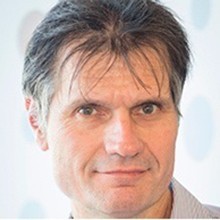Spotlight
Kenneth Aldape
June 2013

So often when we hear the word cancer, our thoughts almost immediately turn to treatment options and how we can fight this disease. However, with all cancers – especially ependymoma, perhaps the most important step in an individual’s treatment plan begins with a proper diagnosis. This month we had the pleasure of hearing from Dr. Kenneth Aldape, Tumor Profiling and Pathology Project Leader, MacFeeters-Hamilton Chair in Brain Tumour Research, at The CERN Foundation and learn more about Project II.
Dr. Aldape graduated from Stanford University in 1986 with a Bachelor’s degree in Philosophy and Biology and attended the University of California, School of Medicine in San Francisco, where he earned his medical degree. After completing his medical degree, he joined the neuro-pathology research team at the University of California, San Francisco for his postdoctoral training. It was during this time, that Dr. Aldape discovered that the primary way we name and diagnose tumors was by viewing and studying them under a microscope. However, even though this method is still currently in use, it doesn’t provide all of the necessary information to fully understand a particular tumor. In order to fully understand and identify the molecular alterations within the tumor, what is really driving the tumor’s behavior, one must go beyond the microscope. So many different factors come into play: why one tumor might be resistant to a particular treatment, why it may or may not have metastasized as well as the differences among patients with regard to symptoms and outcomes.
Dr. Aldape’s strong interest in linking his research in the lab with clinical data has been invaluable to the CERN Foundation Team, and the reason that Dr. Mark Gilbert, the CERN Foundation’s Principal Investigator, asked him to join the CERN Foundation at its’ inception. Along with his research colleagues, he spends his time in the lab looking at the molecular characterization of tumors on a daily basis and linking it with patient outcomes. He and his researchers have already identified different molecular subtypes of ependymoma that will help determine better treatment plans for patients. When we asked Dr. Aldape about his experience with the CERN Foundation, he had this to say, “The CERN Foundation brings together a group of people who are experts in a field that previously wasn’t well studied. There is no other group like it in the world that focuses on this particular type of tumor, and because of this, we have truly developed a diverse understanding of ependymoma, scientifically and clinically.”
Dr. Aldape’s hope for the future of the CERN Foundation is that we will be conducting personalized medicine for patients diagnosed with ependymoma through our pediatric and adult clinical trials. Without a doubt, having a team member like Dr. Aldape with his knowledge and drive for bettering not only treatment, but ependymoma diagnosis, we are certain to get there!
Dr. Aldape and his lovely wife, who is a physician, have a daughter attending Columbia University and a son who is a junior in high school. He loves to spend his “spare” time doing triathlons and is ecstatic when he can actually complete one!
With Gratitude and Recognition: Khalida Wani, Ph.D., Mark Gilbert, M.D., Terri Armstrong, Ph.D.
